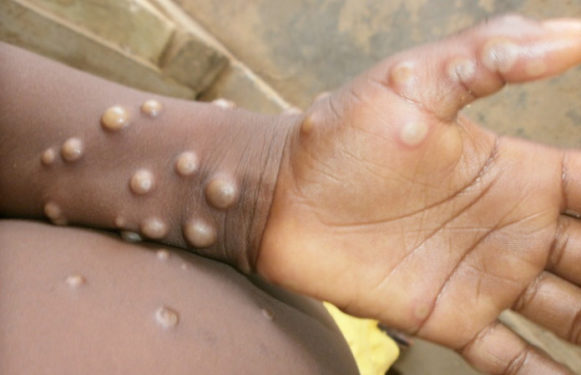The Ghana Health Service (GHS) has verified an increase in positive monkeypox cases to 18.
The Director of GHS, Patrick Kuma-Aboagye, announced during a Covid-19 briefing on Wednesday in Accra that 18 of 72 suspected cases tested as of June 14, 2022 had been proven positive.
“The last case to have ever found was a week ago, so that is where we are as far as monkeypox is concerned,” he said.
He added that “Let’s not make it appear as if monkeypox had just appeared in Ghana. We can’t have a disease that spreads to the countries to your left and right, and then the virus jumps over you. But now that we are actively searching, we are finding them, which is good because it means we can stop the spread.”
Read Also: Samini elected as GIMPA SRC President
Infected persons vary in age from 9 months to 41 years old, according to him. However, there have been no documented fatalities as a result of the infection.
He said that the bulk of the cases had been recorded in Greater Accra, Ashanti, Bono, and the Eastern Regions.
Meanwhile, Tedros Adhanom Ghebreyesus, Director-General of the World Health Organization (WHO), has stated that an emergency committee meeting would be held today, Thursday, June 23 to review the impact of the monkeypox virus epidemic.
The committee will be entrusted with determining “whether this epidemic constitutes a public health emergency of international concern,” according to him.
Mr. Ghebreyesus stated that the decision to assemble the group was partly motivated by the virus’s recent “unusual” behavior as it continues to spread in nations outside of Africa.
About monkeypox
Monkeypox is endemic in Benin, Cameroon, Central African Republic, Democratic Republic of the Congo, Gabon, Ghana, Ivory Coast, Liberia, Nigeria, Republic of the Congo, Sierra Leone, and South Sudan.
Transmission of virus
Transmission is predominantly by droplet respiratory particles, which require prolonged face-to-face contact, putting household members of active cases at a higher risk of infection.
Transmission may also occur by inoculation or through the placenta (congenital monkeypox). To present, there is no evidence that person-to-person transmission may sustain monkeypox infections in humans.
Close contact with infected respiratory tract secretions, skin lesions (open wounds/injuries) of an infected individual, or items recently contaminated by patient fluids or lesion materials may result in secondary, or human-to-human, transmission.
Symptoms
The infection can be divided into two periods:
The invasion period (0-5 days) characterised by fever, intense headache, lymphadenopathy (swelling of the lymph node), back pain, myalgia (muscle ache) and an intense asthenia (lack of energy).
The skin eruption period (within 1-3 days after the appearance of fever) where the various stages of the rash appears, often beginning on the face and then spreading elsewhere on the body.
The face (in 95% of cases), and palms of the hands and soles of the feet (75%) are most affected.
Treatment/Vaccine
Although there are no particular treatments or vaccinations for monkeypox infection, outbreaks may be managed.
Vaccination against smallpox had previously been shown to be 85 percent effective in preventing monkeypox, however the vaccine is no longer accessible to the general population due to its discontinuation after worldwide smallpox eradication.
Prevention
In the absence of a specialized treatment or vaccine, the only option to prevent infection in individuals is to raise awareness of the risk factors and educate people on the steps they may take to limit viral exposure.
Hand washing should be done on a regular basis after caring for or visiting sick people.
Reducing the possibility of animal-to-human transfer In endemic areas, efforts to prevent transmission should concentrate on properly boiling all animal products (blood, meat) before consumption.
It is strongly encouraged to provide public health educational messages via the media – broadcast, electronic, and social.
Healthcare personnel and individuals who have come into contact with patients who have monkeypox or their samples should consider being inoculated against smallpox via their national health authority.
SOURCE: myjoyonline

























